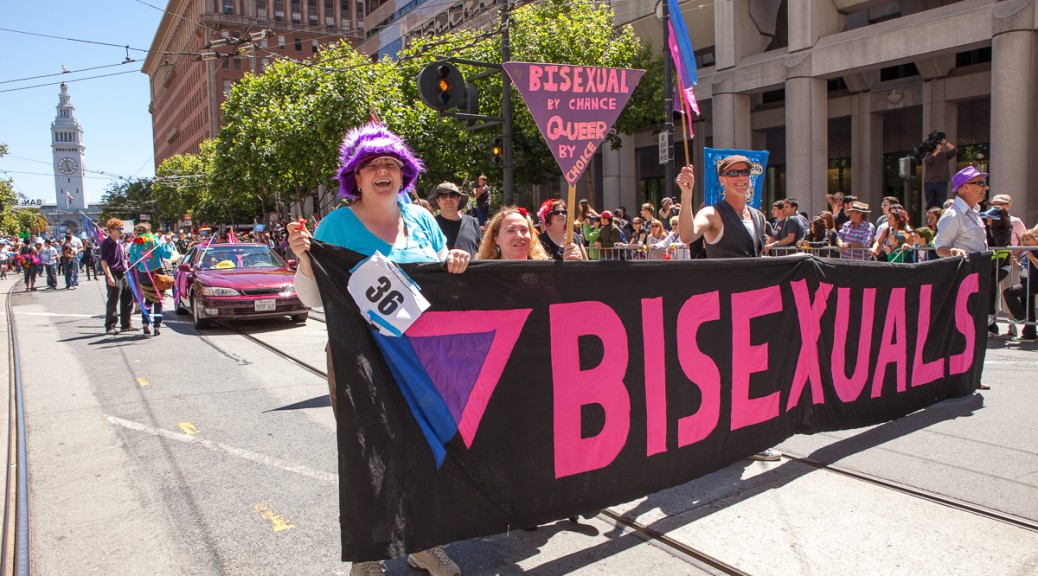[Image: Smiling people parade along Market Street in San Francisco. They are holding a large banner reading BISEXUALS, in pink text on a black background, with pink and blue triangles.]
It seems not a week goes by that I don’t see the Bisexual vs Pansexual debate flare up somewhere on social media. I have many thoughts on this issue, but they are too detailed and nuanced to share as comments whenever this topic comes up. Hence, this blog post.
Soon after I entered puberty at the age of 11 (while being raised as a girl), I realized that I was physically attracted to both typically-male and typically-female bodies. This was 1981 and I was living in West Virginia; I didn’t know any openly gay or bisexual kids, and I couldn’t just jump onto the Internet to learn about sexuality (or gender identity for that matter). We moved to Pittsburgh the following year, but even in high school I didn’t make any openly non-hetero friends. I also realized that romantically, I was really only attracted to boys.
By senior year of college, I had still only dated men, but my attraction to women hadn’t abated. I decided to come out as bisexual. I moved to the San Francisco Bay Area in 1992, and began dating women as well as men. I also came out as polyamorous. I became active in the local bisexual community, attending meetups and marching in the Bisexual contingent of the Pride Parade.
All this time, I understood bisexual to mean “attracted to men and women”. This definition did not necessarily exclude trans people, as binary trans people are simply men and women with a different birth designation. But I knew very few trans people at the time, and nonbinary identities weren’t even on my radar. However, I did know a few people who identified as pansexual, which I understood to mean “attracted to people independent of physical sex characteristics”.
Remember, this all was before widespread Internet access; I couldn’t just browse Tumblr or other social networks to learn how others defined these terms. But I was also living in the San Francisco area, not West Virginia anymore, so I wasn’t completely sheltered from people with non-mainstream sexual orientations or gender identities.
Meanwhile, I wasn’t having much luck with women romantically, and realized my attraction to women almost purely sexual, and limited at that. Living as a cis woman, I might more accurately have described myself as heteroflexible. But the word “hetero” just did not work for me. I simply could not imagine myself as straight. And trying to break down my orientation into components like “bisexual but monoromantic” seemed too cumbersome.
By the year 2013, I realized that I was not a cis woman; I was a trans male with a nonbinary gender identity (which at the time I described as genderqueer and transmasculine, before later amending that to agender). As I still thought of bisexual as meaning “attracted to men and women”, I saw that label as unacceptably binary, for myself. Coupled with the fact that my attraction to women was almost purely physical, I decided that term didn’t fit me anymore. For purposes of sexual orientation, I announced, I was basically a gay male.
Only then did I start seeing bisexuality defined as “attracted to same and other” or “attracted to two or more genders”. I saw some bisexuals saying that there was therefore no point to the pansexual identity. I also saw some bisexuals saying that pansexual was an identity under the umbrella term of bisexuality.
This bothered me, not so much that bi people had this expanded definition of their orientation, but that some implied that bisexuality had always been defined this way, and that anyone who thought otherwise was being biphobic. I could see a young person who never knew life without constant Internet access maybe thinking that way, but I was middle-aged and hadn’t grown up with this privilege.
I especially didn’t like bisexuality being defined as an umbrella term that encompassed pansexuality. People who defined their orientation as pansexual under the thought that bisexual is a binary term might not so readily embrace the idea of being labeled as bisexual. It seems similarly problematic to using “genderqueer” as an umbrella term for nonbinary-identified people, though in the latter case there is the added problem that “queer” was a slur, and not everyone has reclaimed that word. I’m fine with bisexuality being defined in the ways that it is now, but I think that it is still valid to have a separate pansexual identity.
In my own case, I finally decided to just identify as queer. Gay male was too limiting, given my nonbinary gender identity and the fact that I am still physically attracted to typically-female bodies. It’s sort of academic as I’m not seeking new sexual or romantic partners currently, though my spouse and I remain polyamorous. But I’m not willing to throw out all the labels. Labels for sexual and gender identities are useful, but they must be self-chosen.
